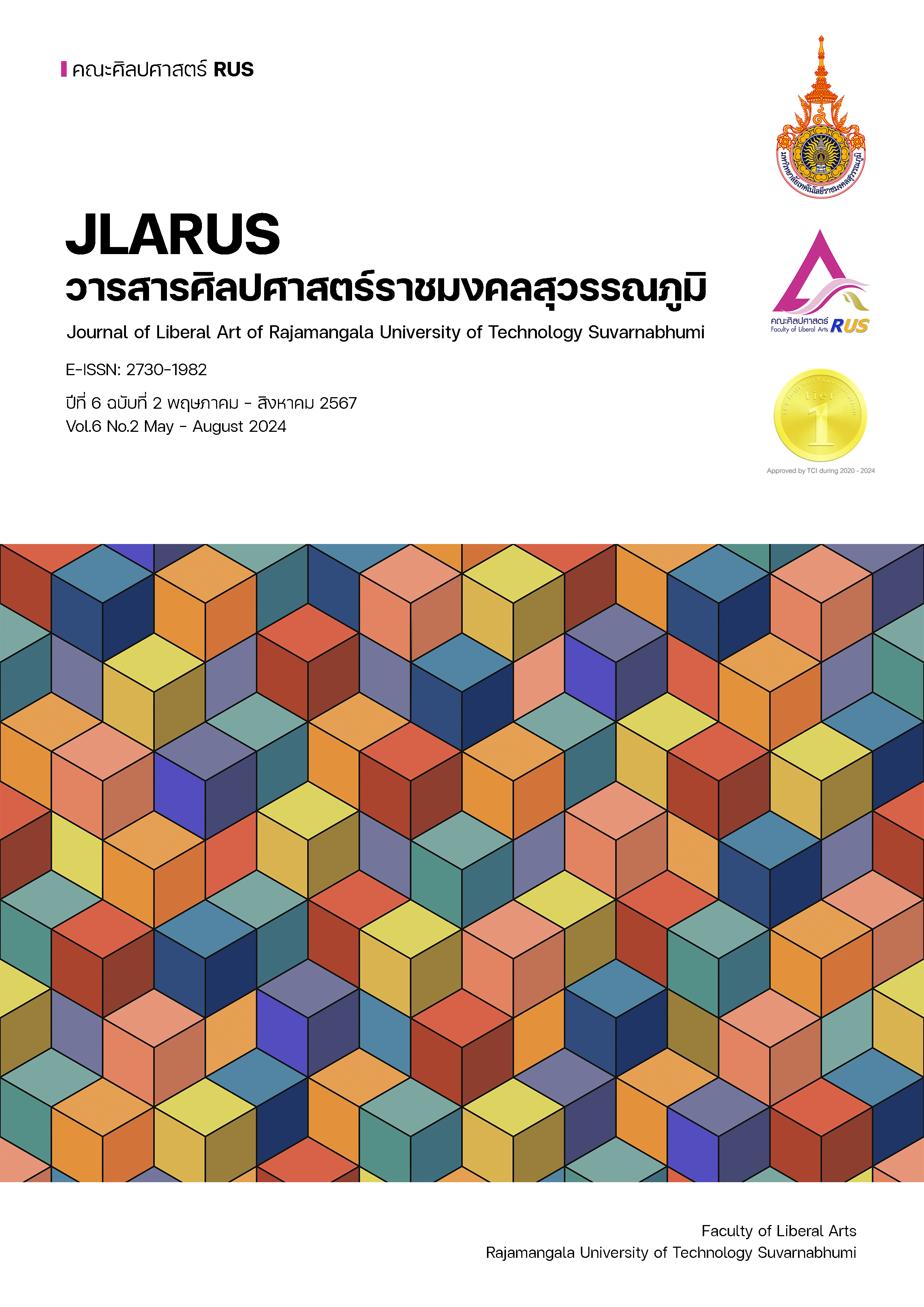A LOGISTIC REGRESSION ANALYSIS OF FACTORS AFFECTING THE SPENDING BEHAVIOR OF MAEJO UNIVERSITY STUDENTS, CHIANGMAI PROVINCE
Main Article Content
Abstract
The Bank of Thailand's study on the development of Household Debt (HHD) provides insight into Thais' borrowing behavior. More than 58% of Thais start accruing debt as soon as they join the job. Notably, inadequate precautionary savings are present in almost 62% of Thai households. If an incident results in a 20% or greater drop in income, these households would find it difficult to pay off debt. Individually, the consequences lead to wealth loss and unstable finances, which in turn cause a host of societal issues. This research aims to study factors influencing spending behavior (SB), Financial Knowledge (FK), and Financial Attitude (FA) of students at Maejo University (MJU), Chiang Mai Province. The data was collected from 400 MJU students through a questionnaire and analyzed by using percentages and Binary Logistic (BL) Regression Analysis. The research findings indicated that the majority of students are female, 20- years- old, in their first year of the Business Administration faculty, do not borrow money from the Student Loan Fund (SLF), have never received scholarships, receive income from parents, and live with both parents. The research revealed that FK, FA, and SB are at a good level. Further analysis using BL Regression showed that factors related to FK and FA influence the SB of MJU students. Specifically, the Odds Ratio for FK is 0.40, indicating that students with poor FK are less likely to have good SB by more than 0.40 compared to students with good FK. Similarly, the Odds Ratio for FAs is 0.076, suggesting that students with poor FA are less likely to have good SB by more than 0.076 compared to students with good FA at 0.05 significant level. The model's suitability was tested by using the Hosmer-Lemeshow test and found to be appropriate.
Article Details

This work is licensed under a Creative Commons Attribution-NonCommercial-NoDerivatives 4.0 International License.
References
Adiputra I. G., Patricia E. (2020). The Effect of FA, FK, and Income on Financial Management Behavior. Advances in Social Science, Education and Humanities Research, 439, 107-112. https://DOI 10.2991/assehr.k.200515.019.
Agarwal P., Ansari M. S., Yadav S., Kureel R. (2015). A study on financial literacy among working women in educational sector of Jhansi district: With special reference to investment avenue. International Journal of Advance Research in Science and Engineering, 4(1), 54–61.
Agus Zainul Arifin. (2017). The Influence of FK, Control and Income on Individual FB, European Research Studies Journal, XX, (3A), 635-648.
Andreou, P.C. and Philip, D. (2018). FK Among University Students and Implications for Personal Debt and Fraudulent Investments. Cyprus Economic Policy Review, 12(2), 3-23. http://dx.doi.org/10.2139/ssrn.3250850.
Bank of Thailand. (2023). Sustainable Solutions for Household Debt. https://app. bot.or.th/landscape/household-debt/concept/
Dwiastanti, A.. (2015). Financial Literacy as the Foundation for Individual FB. Journal of Education and Practice, 6(33), 99-105.
Garg, N. and Singh, S. (2018), "Financial literacy among youth", International Journal of Social Economics, 45(1), 173-186. https://doi.org/10.1108/IJSE-11-2016-0303
Herawati, N.T., Candiasa, I.M.,Yadnyana, I.K., Suharsono, N. (2018). Factors That Influence FB Among Accounting Students in Bali. International Journal of Business Administration. 9(3), 30-38. https://doi.org/10.5430/ijba.v9n3p30
Kaewka T. (27 July 2023). Household Debt Survey for the year 2023 shows an increase of over 500,000 Baht per household. It is expected to rise even further next year.
https://thainews.prd.go.th/th/news/detail/TCATG230727151616389
Kitdamrongtam. P., & Hantrakul. C. (2023). Personal FK, Attitudes and Personal Financial Management Behavior. Modern Management Journal, 21(2), 53-73.
Kritlertkul, C. (2021). FK financial motivation and FA affecting to FB and saving pattern and investment pattern in the situation COVID-19 crisis case study: exclusive customers of Bank B PLC., District Nakhonpathom1 [A Thesis Submitted in Partial Fulfillment of the Requirements for Master of Business Administration] Silpakorn University.
Lomtaku, W., Leewiwatwong, S. and Ratchusanti, S.. (2023). Factors Affecting Thailand University Students’ Saving. Rajapark Journal (Humanities and Social Sciences). 17(51), 192-204.
Miles, J., & Shevlin, M. (2001). Applying Regression and Correlation: A Guide for Students and Researchers. London: Sage.
Narmaditya, B. S., & Sahid, S. (2023). Financial Literacy in Family and Economic Behavior of University Students: A Systematic Literature Review. The Journal of Behavioral Science, 18(1), 114–128. https://so06.tci-thaijo.org/index.php/IJBS/ article/view/257900.
Nuris D.M.,Sahid S.,Hussin M. (2023). Factors Influencing FB of Undergraduate Students: A Systematic Review. Review of Economics and Finance, 21(1), 1-10. https:// doi.org/10.55365/1923.x2023.21.1.
Obagbuwa, O., and Kwenda, F.. (2020). Determinants of Students' Spending Habits: a Case Study of Students at a Premier University of African Scholarship. African Journal of Business and Economic Research. 15, 25-43. https:// DOI:10.31920/1750-4562/2020/v15n4a2.
OECD. (2018), OECD/INFE Toolkit for Measuring Financial Literacy and Financial Inclusion. https://www.oecd.org/financial/education/2018-INFE-FinLit-Measurement-Tool kit.pdf.
Office of Academic Administration and Development Maejo University. (2023). Current Student Enrollment Data (by Faculty). http://www.education.mju.ac.th/Stat/ StudentCurrent-Faculty.aspx.
Permsook N. (2019). Financial literacy affecting the wealth of teaching professionals in the Bangkok metropolitan region. [Independent research for Master of Business Administration] Rajamangala University of Technology Thanyaburi.
Potrich, A. C. G., Vieira, K. M., & Kirch, G.. (2015). Determinants of Financial Literacy: Analysis of the Influence of Socioeconomic and Demographic Variables. Revista Contabilidade & Finance, 26(69), 362–377. https://doi.org/10.1590/1808-057x 201501040.
Potrich, A. C. G., Vieira, K. M., & Mendes-Da-Silva W. (2016). Development Of A Financial Literacy Model For University Students. Management Research Review. 39(3), 356-376. http://dx.doi.org/10.1108/MMR-06-2014-0143.
Rootman, C. and Antoni, X. (2015). Investigating Financial Literacy to Improve FB Among Black Consumers. Journal of Economic and Financial Sciences. 8(2), 474-494. http://DOI:10.4102/jef.v8i2.104.
Sebstad J, Cohen M. and Stack K. (2006). Assessing The Outcomes Of Financial Education. https://www.findevgateway.org/guide-toolkit/2005/01/assessing-out comes-financial-education-working-paper-3
Sithikan, W.. (2017). Factors associated with health promotion behaviors of the elderly in Ban Hong Subdistrict Municipality, Ban Hong District, Lamphun Province. [A Thesis Submitted in Partial Fulfillment of the Requirements for Master of Public Health Program] Chiangmai Rajabhat University.
Topa G., Hernández-Solís M. and Zappalà S. (2018). Financial Management Behavior Among Young Adults: The Role of Need for Cognitive Closure in a Three-Wave Moderated Mediation Model. Frontier in Psychology. 9:2419. https://doi: 10.3389/fpsyg.2018.02419.
Vanichbuncha, K.. (2009). Advanced Statistical Analysis with SPSS for Windows. (7th edition). Bangkok: Thammasat.


